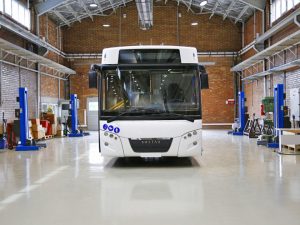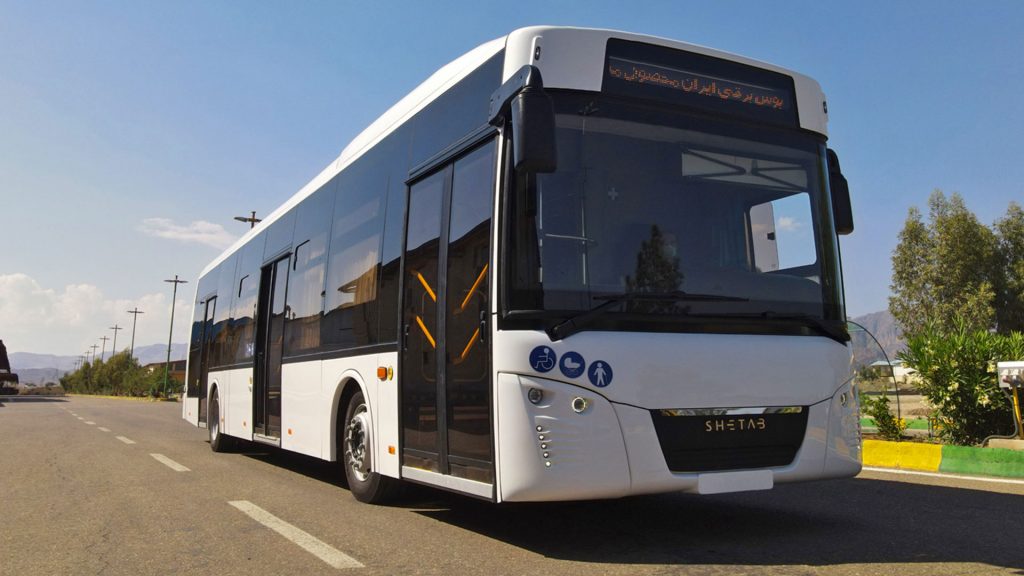Transportation is an inseparable part of human life, and people rely on their vehicles for their daily tasks. However, conventional transport has turned into a dilemma as it is associated with environmental degradation and air pollution. Smog-inducing vehicles have plagued millions of lives in major cities, while also raising concerns about the depletion of natural resources. Replacing fossil fuels with electricity is one approach to curb carbon footprints.
Modern transportation and smart city traffic management are revolutionizing cities’ approach toward mobility, while also reducing congestion on city streets. Imagine a world in which electric cars, buses, and trains replace poison-spewing vehicles. Such a transition will improve air quality, reduce emissions, cut costs, and provide the public with smoother and more extensive service. Electric vehicles are also quieter than gasoline/diesel ones, which means less noise pollution.
MAPNA Group, as a leading industrial player in Iran and the region, has always prioritized environmental protection and the development of fossil-free transport infrastructures. To address this concern, the Group has provided a range of solutions within the latest global standards. Such efforts have paid off in the form of fresh initiatives, including the development and commissioning of electric buses in the northeastern city of Mashhad.
Parsan Electric Bus Production Company – commercially known as ‘Shetab’ – was jointly established by MAPNA Group and Oghab Afshan Industrial and Manufacturing Company – producer of Scania buses in Iran – in September 2020, with the aim of electrifying the public transportation system.
The company’s objective is to design, manufacture and supply electric urban buses, as well as developing other commercial EVs. The joint venture’s first project, the development of electric buses, is now complete and will enter the mass production stage in the coming months.
The monocoque design of the body and chassis structure distinguishes Shetab electric bus from typical models. The low-deck bus has no steps and is built on a product lifecycle management platform (PLM), which allows several firms to work simultaneously on all technical processes, including detailed and master design, engineering, manufacturing, and project management. It’s a smart vehicle with data center connectivity, energy recovery, quick charging, and a cutting-edge display system. The vehicle’s cooling system was created with Iran’s environment in mind. Shetab electric buses will be offered in a number of packages, each with a different battery capacity to fit the needs of each route.
MAPNA Group’s localization of green buses represents a significant step forward in the electrification business, as well as a contribution to the country’s industrial growth plans.
Over 60% of the Shetab electric bus is designed and manufactured domestically. MAPNA intends to achieve 100% indigenization by investing in parallel battery and engine development projects. MAPNA Group has created a solid opportunity for the project to grow by employing professionals and hardworking university graduates in the sectors of electricity, electronics, power electronics, programming and software development, data analysis, intelligence, and system engineering. The expansion of the research infrastructure will also help in the application of this technology to other modes of transportation, such as personal automobiles and semi-heavy and heavy commercial vehicles.
Modern transportation and smart city traffic management are revolutionizing cities’ approach toward mobility, while also reducing congestion on city streets. Imagine a world in which electric cars, buses, and trains replace poison-spewing vehicles. Such a transition will improve air quality, reduce emissions, cut costs, and provide the public with smoother and more extensive service. Electric vehicles are also quieter than gasoline/diesel ones, which means less noise pollution.
MAPNA Group, as a leading industrial player in Iran and the region, has always prioritized environmental protection and the development of fossil-free transport infrastructures. To address this concern, the Group has provided a range of solutions within the latest global standards. Such efforts have paid off in the form of fresh initiatives, including the development and commissioning of electric buses in the northeastern city of Mashhad.
Parsan Electric Bus Production Company – commercially known as ‘Shetab’ – was jointly established by MAPNA Group and Oghab Afshan Industrial and Manufacturing Company – producer of Scania buses in Iran – in September 2020, with the aim of electrifying the public transportation system.
The company’s objective is to design, manufacture and supply electric urban buses, as well as developing other commercial EVs. The joint venture’s first project, the development of electric buses, is now complete and will enter the mass production stage in the coming months.
The monocoque design of the body and chassis structure distinguishes Shetab electric bus from typical models. The low-deck bus has no steps and is built on a product lifecycle management platform (PLM), which allows several firms to work simultaneously on all technical processes, including detailed and master design, engineering, manufacturing, and project management. It’s a smart vehicle with data center connectivity, energy recovery, quick charging, and a cutting-edge display system. The vehicle’s cooling system was created with Iran’s environment in mind. Shetab electric buses will be offered in a number of packages, each with a different battery capacity to fit the needs of each route.
MAPNA Group’s localization of green buses represents a significant step forward in the electrification business, as well as a contribution to the country’s industrial growth plans.
Over 60% of the Shetab electric bus is designed and manufactured domestically. MAPNA intends to achieve 100% indigenization by investing in parallel battery and engine development projects. MAPNA Group has created a solid opportunity for the project to grow by employing professionals and hardworking university graduates in the sectors of electricity, electronics, power electronics, programming and software development, data analysis, intelligence, and system engineering. The expansion of the research infrastructure will also help in the application of this technology to other modes of transportation, such as personal automobiles and semi-heavy and heavy commercial vehicles.
MAPNA Group has a clear vision for the export of e-buses in the future and is committed to offering electrification services in the regional markets. As urban areas shift to a more sustainable approach, MAPNA Group can leverage its trailblazing experience and substantial investment in private e-mobility to offer zero-emissions transportation solutions for neighbors.
Converting public vehicle fleets is just the beginning. Electric buses not only offer a clear win for the public by making journeys more comfortable, quieter and cleaner, but they also encourage car drivers to decrease their carbon footprints by using public transportation.
Converting public vehicle fleets is just the beginning. Electric buses not only offer a clear win for the public by making journeys more comfortable, quieter and cleaner, but they also encourage car drivers to decrease their carbon footprints by using public transportation.


 فارسی
فارسی Français
Français العربية
العربية
